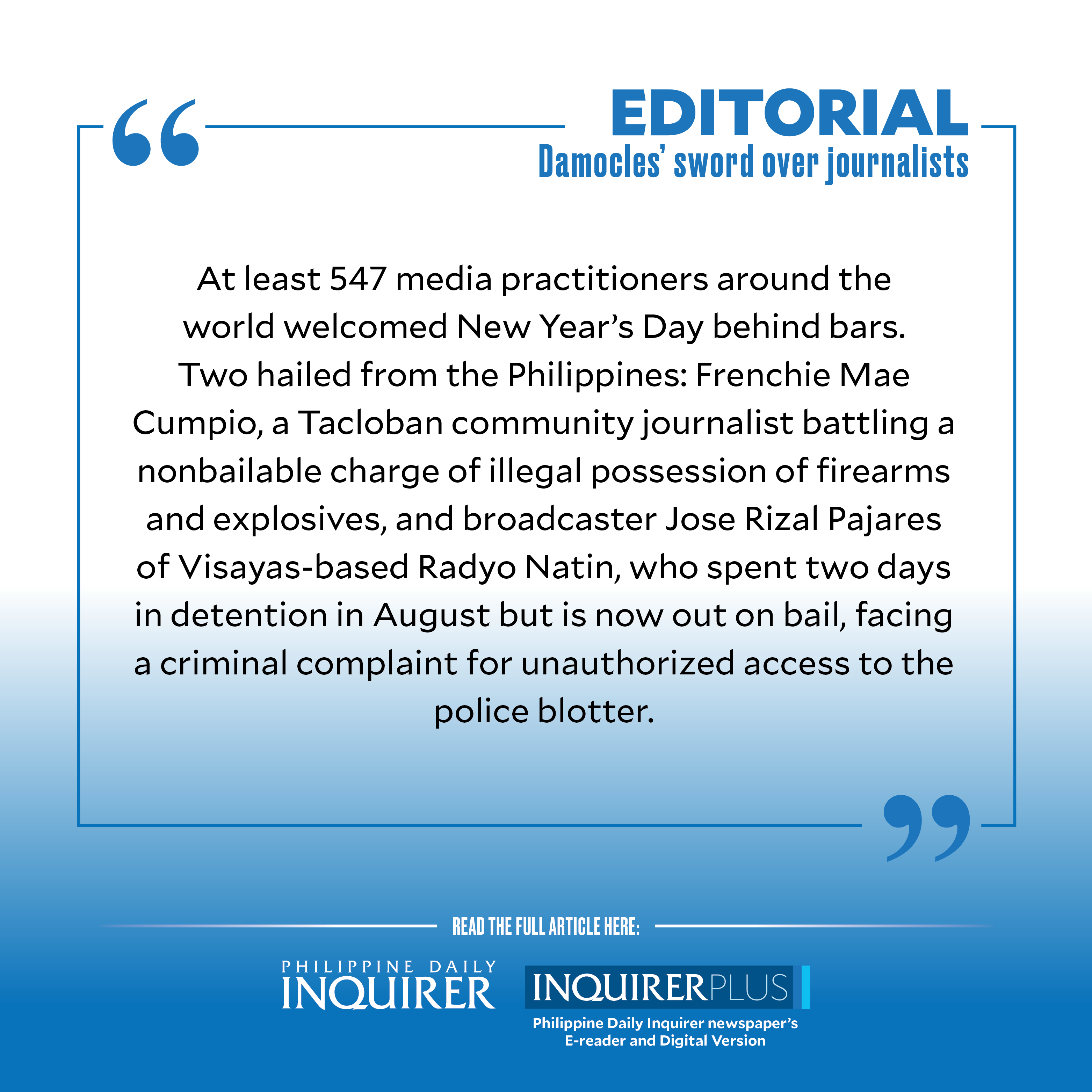Damocles’ sword over journalists

Here or elsewhere, journalists can’t catch a break.
At least 547 media practitioners around the world welcomed New Year’s Day behind bars, according to a year-end report of French press watchdog Reporters Without Borders (Reporters sans frontières or RSF). They were among the 779 journalists from 45 countries jailed or imprisoned at one point in 2023, with the latter serving sentences ranging from a week to 20 years, the report showed.
Not surprisingly, two hailed from the Philippines: Frenchie Mae Cumpio, a Tacloban community journalist battling a nonbailable charge of illegal possession of firearms and explosives, and broadcaster Jose Rizal Pajares of Visayas-based Radyo Natin, who spent two days in detention in August but is now out on bail, facing a criminal complaint for unauthorized access to the police blotter.
Truth-telling profession
As everyone knows, the threats facing journalists, especially in the Philippines, are not limited to imprisonment, and there are certainly far more serious cases, such as killing, torture, and harassment, of which our history is replete with examples dating back to the Marcos dictatorship and recent administrations.
But make no mistake about it—detention is not any less chilling or harmful to the truth-telling profession. The act might even be more insidious, as a result of the kind of message it sends to both purveyors and consumers of news, when media workers are punished like ordinary criminals for performing their jobs.
“Each journalist in prison is by definition a journalist prevented from working,” said RSF secretary general Christophe Deloire, adding: “It’s also a journalist who will be intimidated in the future. And it’s hundreds or even thousands of colleagues feeling a threat hanging over their head.”
Badge of honor
Some journalists have carried their time in jail like a badge of honor, proof that their work is consequential enough to have riled up the ruling powers and invited punitive measures.
In February 2019, Rappler founder and CEO Maria Ressa spent a night in the conference room of the National Bureau of Investigation after a Pasay court refused to process her bail on a cyberlibel charge filed by a property developer. In June 2020, she and a former colleague were convicted of the crime and sentenced by the Manila Regional Trial Court to a maximum six years in prison.
A little over a year later, Ressa, along with Dmitry Muratov of Russia, won the Nobel Peace Prize “for their efforts to safeguard freedom of expression, which is a precondition for democracy and lasting peace.”
But even that accolade could barely be of any help in Ressa’s legal troubles. In October 2022, the Court of Appeals affirmed the lower court’s decision, even extending her sentence by eight months. Ressa, who is facing several other cases, has elevated her appeal to the Supreme Court.
For all her travails, the Rappler leader is at least protected by the international attention and scrutiny, putting pressure on the government and the judiciary to err on the side of prudence, lest either be shamed for persecuting a Nobel laureate.
Occupational hazard
That is not the case for the likes of Cumpio, who will have spent four years in jail on Feb. 7, on charges media groups contend were meant to target her after she was Red-tagged, or branded a communist, by the authorities.
Many other media practitioners, including those from this paper’s newsroom, are quietly contending with libel or other criminal complaints in prosecutors’ offices or trial courts nationwide, often, for angering the wealthy or the powerful.
That libel and cyberlibel are criminal offenses punishable by imprisonment is a lamentable occupational hazard for journalists. But the good news is that the tide may be turning.
In October, the Supreme Court emphasized in one ruling that as the penalty for both traditional and online forms of libel, “a fine can be imposed in lieu of imprisonment,” under the Revised Penal Code, as amended, and the Cybercrime Prevention Act.
Decriminalize libel
In December, noted academic and activist Walden Bello, the subject of a cyberlibel suit filed by a former aide of now Vice President Sara Duterte, petitioned the high court to void libel laws for violating the Bill of Rights.
Also, Speaker Martin Romualdez spoke out in support of measures to decriminalize libel and other crimes to ease crowded jails and prisons.
But the proof of the pudding is in the eating. For as long as either offense remains punishable by imprisonment, such a persistent threat will hang like the sword of Damocles over journalists.
To be clear, the call to decriminalize libel statutes is not meant to protect members of the press as a special class nor to invalidate the harm of defamatory language, but to ensure, as Romualdez put it, “that punishments are proportionate to the gravity of the crimes.” It’s high time that libel and cyberlibel ceased being used as weapons against journalists, not just for themselves but for the public that they serve to empower with truth and information.




















